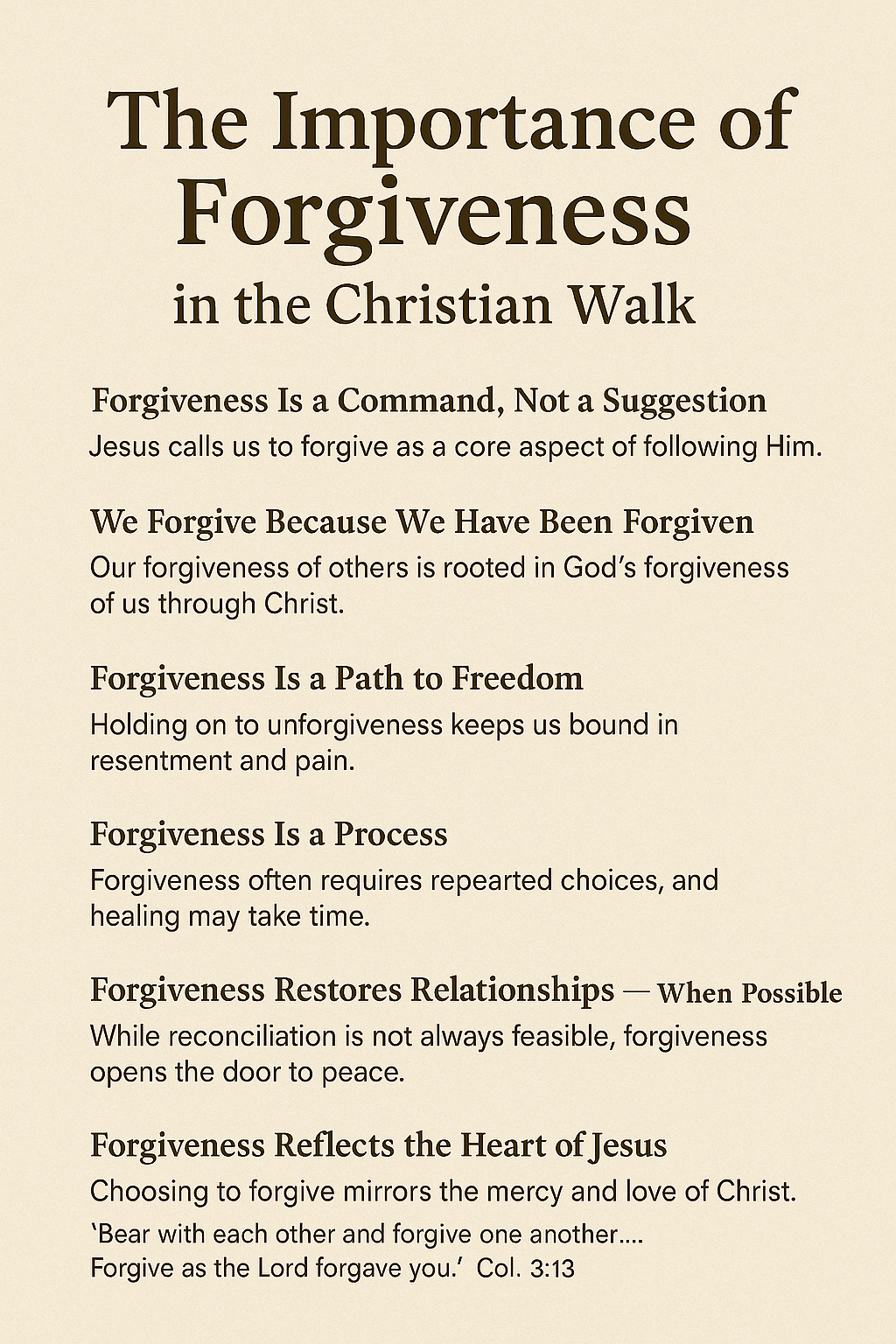Forgiveness is one of the most powerful and difficult commands in the Christian life. It’s easy to say we believe in forgiveness, but much harder to live it out when we’ve been deeply hurt. Yet, throughout Scripture, forgiveness is not optional — it’s foundational. It reflects the very heart of God and shapes our relationship with Him and others.
If you want to walk closely with Jesus, forgiveness must become a central part of your life. Let’s explore what the Bible teaches about forgiveness and how it transforms us.
Forgiveness Is a Command, Not a Suggestion
Jesus made it clear: we are called to forgive. Not when it’s easy. Not if the other person apologizes. But as a way of life.
“But if you do not forgive others their sins, your Father will not forgive your sins.” – Matthew 6:15
This isn’t about earning God’s forgiveness — it’s about reflecting the forgiveness we’ve already received. When we withhold grace from others, we block the flow of grace in our own hearts.
We Forgive Because We Have Been Forgiven
The foundation of Christian forgiveness is what Jesus did for us on the cross. He forgave us — fully, freely, and undeservedly. That’s our model.
“Be kind and compassionate to one another, forgiving each other, just as in Christ God forgave you.” – Ephesians 4:32
When you grasp the depth of God’s mercy toward you, it becomes possible (and necessary) to extend that mercy to others. Forgiveness is not about keeping score — it’s about keeping grace flowing.
Forgiveness Is a Path to Freedom
Holding on to unforgiveness traps you in bitterness, resentment, and pain. You may think you’re punishing the other person, but you’re actually imprisoning yourself. Forgiveness doesn’t deny the wrong — it releases you from its power.
“It is for freedom that Christ has set us free…” – Galatians 5:1
When you forgive, you open your heart to healing. You choose peace over poison. You break the cycle of offense and step into the freedom Jesus died to give you.
Forgiveness Is a Process
Forgiveness is both an act and a journey. You may say, “I forgive you,” and still feel anger later. That doesn’t mean you failed. Forgiveness often needs to be reaffirmed daily, especially when the wound is deep.
God understands the struggle. Bring your pain to Him. Ask for strength to release the offense, again and again if necessary.
“How many times shall I forgive my brother or sister…? Jesus answered, ‘I tell you, not seven times, but seventy-seven times.’” – Matthew 18:21–22
Forgiveness is a daily decision to walk in grace.
Forgiveness Restores Relationships — When Possible
While forgiveness is commanded, reconciliation isn’t always possible or wise. Sometimes relationships are too toxic or unsafe to be fully restored. In such cases, you can still forgive — release the offense to God — without returning to a harmful situation.
Forgiveness is what you do in your heart. Reconciliation requires repentance, mutual effort, and trust.
“If it is possible, as far as it depends on you, live at peace with everyone.” – Romans 12:18
Forgive fully, even if reconciliation doesn’t follow.
Forgiveness Reflects the Heart of Jesus
Jesus forgave while hanging on the cross — not after the pain ended, but in the midst of it.
“Father, forgive them, for they do not know what they are doing.” – Luke 23:34
When you choose to forgive, you mirror the heart of Christ. You show a hurting world what grace looks like. And you allow the Holy Spirit to soften and shape your soul.
Forgiveness is not weakness — it’s spiritual strength. It’s divine love in action.
How to Begin Forgiving Someone
If you’re struggling to forgive someone, here’s how to begin the journey:
1. Acknowledge the Pain
Don’t minimize or deny the hurt. God invites you to be honest about your wounds.
2. Take It to God
Tell Him everything — your anger, confusion, sadness. He can handle it all.
3. Choose to Forgive
Even if you don’t feel like it. Forgiveness is a choice you make by faith.
4. Pray for the Offender
It may be hard at first, but praying for them releases bitterness and invites healing.
5. Repeat as Needed
Forgiveness is often a process. Keep giving it to God as often as it comes up.
“Bless those who curse you, pray for those who mistreat you.” – Luke 6:28
What Forgiveness Is Not
To truly embrace forgiveness, it’s important to understand what it doesn’t mean:
- It’s not excusing or ignoring the wrong.
- It’s not pretending everything is okay.
- It’s not forgetting — but choosing not to hold it against them.
- It’s not allowing abuse or sin to continue unchecked.
Forgiveness is not about changing the other person — it’s about changing your own heart.
Forgiven People Forgive
At the heart of the gospel is forgiveness. Jesus took our sins, bore our punishment, and gave us mercy instead of wrath. If we have received that grace, we are called to give it.
Forgiveness won’t always be easy. But it will always be worth it. It brings freedom, healing, and alignment with the heart of God.
So who do you need to forgive today? Invite Jesus into that place. Let His love do what you cannot do alone.
“Bear with each other and forgive one another… Forgive as the Lord forgave you.” – Colossians 3:13

